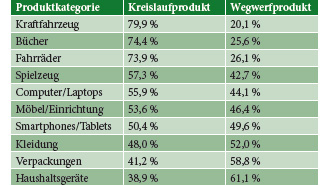The equivalent of around 10 kilograms of electronic waste is generated by every inhabitant in Germany every year. But where do Germans currently stand when it comes to the circular economy, which product categories are best reused and what potential still lies dormant here? The iPhone refurbisher Swappie looked into this and asked Germans about their attitude towards the circular economy in a representative survey. The study was conducted in March 2023 among 1075 participants.
Recycling was rated most important by 96.3% of respondents and leasing (52.1%) was given less importance. It is striking that while 92.4% of Germans are in favor of repairs, only 73% rate a ban on planned product wear and tear (obsolescence) as important. However, many repairs and, above all, new purchases would become superfluous if the devices were built to last longer and did not break after the minimum warranty expired. This can also be applied to smartphones, which are no longer supplied with software updates after a few years.
Almost three quarters of all Germans (74.1%) consider the concept of refurbishing to be important for the circular economy. This is all the more pleasing as the term and the associated concept are fairly new and still need to become more established. Refurbishing involves replacing and repairing a technical device, such as a smartphone, after an inspection so that it is ready for resale. This increases the overall lifespan of the product and avoids electronic waste.
Swappie also asked Germans about their assessment of which products they currently perceive as disposable or circular products. Almost 8 out of 10 Germans (Ø 79.9%) consider the car to be the top circular product. However, the more expensive the products were to buy, the more likely they are to be sold second-hand. In contrast, more than 6 out of 10 Germans (Ø 61.1%) rate household appliances as top disposable products.


